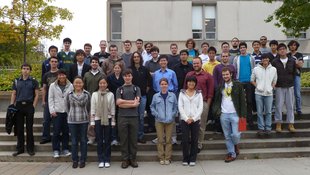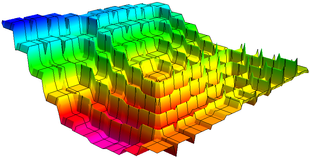|
|
| Line 15: |
Line 15: |
|
[http://katlas.math.toronto.edu/drorbn/images/0/01/10-327-lec05p03.jpg Lecture 5 page 3] |
|
[http://katlas.math.toronto.edu/drorbn/images/0/01/10-327-lec05p03.jpg Lecture 5 page 3] |
|
|
|
|
|
[[User:Xwbdsb|Xwbdsb]] 20:26, 27 September 2010 (EDT)Question |
|
[[User:Xwbdsb|Xwbdsb]] 20:26, 27 September 2010 (EDT)Question: |
|
|
Dror you said in class the set of permutations of 0's and 1's could be mapped "bijectively" onto |
|
|
the unit interval [0,1] and hence is not countable.Is it true that every real number in the unit |
|
|
interval has more than one binary expansion? Is it possible to map the set of all permutations onto |
|
|
N union {0}? (the first number stands for 2^0, second stands for 2^1, etc.) |
|
|
-Kai |
Revision as of 19:32, 27 September 2010
| Additions to the MAT 327 web site no longer count towards good deed points
|
| #
|
Week of...
|
Notes and Links
|
| 1
|
Sep 13
|
About This Class, Monday - Continuity and open sets, Thursday - topologies, continuity, bases.
|
| 2
|
Sep 20
|
Monday - More on bases, Thursdsay - Products, Subspaces, Closed sets, HW1, HW1 Solutions
|
| 3
|
Sep 27
|
Monday - the Cantor set, closures, Thursday, Class Photo, HW2, HW2 Solutions
|
| 4
|
Oct 4
|
Monday - the axiom of choice and infinite product spaces, Thursday - the box and the product topologies, metric spaces, HW3, HW3 Solutions
|
| 5
|
Oct 11
|
Monday is Thanksgiving. Thursday - metric spaces, sequencial closures, various products. Final exam's date announced on Friday.
|
| 6
|
Oct 18
|
Monday - connectedness in [math]\displaystyle{ {\mathbb R} }[/math], HW4, HW4 Solutions, Thursday - connectedness, path-connectedness and products
|
| 7
|
Oct 25
|
Monday - Compactness of [math]\displaystyle{ [0,1] }[/math], Term Test on Thursday, TT Solutions
|
| 8
|
Nov 1
|
Monday - compact is closed and bounded, maximal values, HW5, HW5 Solutions, Wednesday was the last date to drop this course, Thursday - compactness of products and in metric spaces, the FIP
|
| 9
|
Nov 8
|
Monday-Tuesday is Fall Break, Thursday - Tychonoff and a taste of Stone-Cech, HW6, HW6 Solutions
|
| 10
|
Nov 15
|
Monday - generalized limits, Thursday - Normal spaces and Urysohn's lemma, HW7, HW7 Solutions
|
| 11
|
Nov 22
|
Monday - [math]\displaystyle{ T_{3.5} }[/math] and [math]\displaystyle{ I^A }[/math], Thursday - Tietze's theorem
|
| 12
|
Nov 29
|
Monday - compactness in metric spaces, HW8, HW8 Solutions, Thursday - completeness and compactness
|
| 13
|
Dec 6
|
Monday - Baire spaces and no-where differentiable functions, Wednesday - Hilbert's 13th problem; also see December 2010 Schedule
|
| R
|
Dec 13
|
See December 2010 Schedule
|
| F
|
Dec 20
|
Final exam, Monday December 20, 2PM-5PM, at BR200
|
| Register of Good Deeds
|

Add your name / see who's in!
|

See Hilbert's 13th
|
|
See some blackboard shots at BBS/10_327-100927-142655.jpg.
Video:  Topology-100927
Topology-100927
|
|
Dror's notes above / Student's notes below
|
|
Here are some lecture notes..
Lecture 5 page 1
Lecture 5 page 2
Lecture 5 page 3
Xwbdsb 20:26, 27 September 2010 (EDT)Question:
Dror you said in class the set of permutations of 0's and 1's could be mapped "bijectively" onto
the unit interval [0,1] and hence is not countable.Is it true that every real number in the unit
interval has more than one binary expansion? Is it possible to map the set of all permutations onto
N union {0}? (the first number stands for 2^0, second stands for 2^1, etc.)
-Kai
![]() Topology-100927
Topology-100927

